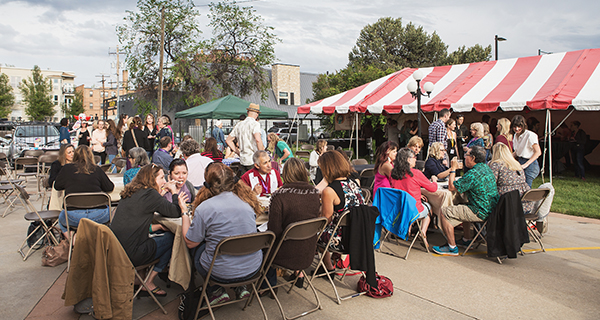
Editor's Note: This is the seventh in a series of essays and podcasts in which readers and writers from all corners of the Lighthouse Writers Workshop community express why they believe in our mission to elevate the literary arts. Please support these important programs on Colorado Gives Day, December 10, when every gift is boosted by a $1.5 million incentive fund. Save time by scheduling your gift today; just select “Colorado Gives Day” under frequency and your donation will be processed on the 10th and boosted by the incentive fund.
A roundtable discussion I recently did with the marvelous Lighthouse instructor Emily Sinclair and the phenomenal short story writer Emily Wortman-Wunder (no relation!) got me thinking about place: its role in my writing and life, and what, exactly, it is. Our conversation brought up the idea of place as more than physical setting, encompassing culture, status, community, emotional and psychological condition, and then some. In my writing, I’m notoriously (to me) place-adverse. I always have to force external details onto the page. And yet, so much of my life, in retrospect, comes to me through place: I identify who I was by where I was.
In 2001, when I moved from Fort Collins to Denver, I was young and unencumbered. Through the dusty lens of nostalgia, that’s how I see it, though I was already past thirty and weighed down by various burdens: a mood disorder gone wild, loneliness and self-doubt, a lost career plan. But outside of my retail job, I could come and go as I pleased, stepping out to the Denver Public Library to borrow a tall stack of books, ambling over to the 16th Street Mall to catch an impromptu matinee. For fun, my then-boyfriend-now-husband and I frequented metro Denver’s cheapest all-you-can-eat buffets. After, we’d rent a video and return to our studio apartment, where we’d huddle in front of the TV with our own pints of Ben & Jerry’s. I liked Chocolate Fudge Brownie; he liked Chubby Hubby.
During this time, I attended my first Lighthouse workshop, at a cavernous art gallery with a small, well-lit meeting room. The first night, we met on the patio but soon migrated inside due to light-rail noise. I adored everything about that location: the wrought-iron outdoor tables, the warped hardwood floor offering up strange bronze statues, the cozy circle of sofas and chairs where we finally took root. And the people: Smart! Talented! Supportive! I loved the quirky setting of the class, but I also treasured the place it offered me: not just physically, but creatively and intellectually and socially. I’d found some fellow travelers to help me on my way.
When Lighthouse traded the art-gallery digs for a suite in a sterile office building, I wasn’t pleased. But my displeasure quickly passed. Everything important about Lighthouse endured: the vigorous, supportive discussions about writing warmed the room beneath the cool fluorescent light, and the new circle of sofas and chairs remained cozy. Besides, who was I to judge? I’d moved too, up north, a transition followed by marriage, a house, kids, various gigs I could do from home while raising said kids—the whole shebang. Due to health issues discovered during my pregnancies, I gave up the Ben & Jerry’s. All-you-can-eat-buffets, on the rare occasion we made it to one, became eat-the-few-dishes-that-won’t-cause-an-early-death buffets. And movies? Time alone with my husband? What the hell was that? Which is to say, for a while I was lost in space, and Lighthouse--on its own journey from the office suite to the Thomas Ferril House to the current location at 1515 Race Street—fell out of reach.
Then one day, Lighthouse emailed me an invitation to try an online class: Jessica Roeder’s Experimental/Hybrid Workshop. My kids were old enough for me to squeeze in some class time, and I could do so at my convenience, from the chaotic comfort of own home. Jessica’s readings and exercises, along with the encouraging presence of my peers, revolutionized my writing, and I felt the same revelatory spark I’d experienced at my first Lighthouse class: I’d found my place, and it was the same place, minus the superficial trimmings, I’d already known and loved. Now I teach online for Lighthouse, and it brings me the same feeling of community and inspiration and joy. Even as I type at my desk alone, I’m connected to something larger: my sense of place expands.
I’ve long subscribed to the maxim, 'Wherever you go, there you are': you can’t escape yourself. But sometimes you find places where you don’t want to, the magical places that both welcome you as is and change you for the better. Lighthouse, in all its evolving forms, is that kind of place for me. Maybe place is less a physical entity than a web of relationships.
Maybe it’s everything.
Jennifer Wortman is the author of the short story collection This. This. This. Is. Love. Love. Love (Split Lip Press). Her fiction, essays, and poetry appear in Glimmer Train, Normal School, DIAGRAM, Electric Literature, The Collagist, Brevity, North American Review, SmokeLong Quarterly, Juked, and elsewhere. She is an associate fiction editor for Colorado Review.
Read the other entries in the Colorado Gives Day 2019 series:
"Like a Form of Release" by David Mejia
“Monumental Fun” by Susan Blosten
"Confessions of a Night Writer" by Twanna LaTrice Hill
"To Build Impossible Worlds" by Connor Rodenbeck
“A Mission of Compassion” by Michael Sindler
“It Takes a Village” by Tiffany Quay Tyson

